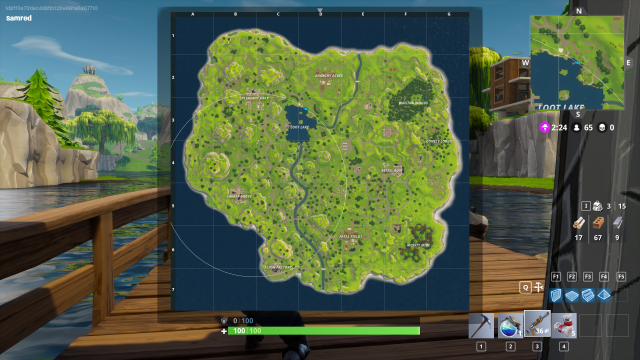In the months since PlayerUnknown's Battlegrounds became an out-of-nowhere top-selling hit, the Battle Royale genre of last-man-standing free-for-alls has been surging in popularity. Brendan "PlayerUnknown" Greene, though, says he isn't too happy with the slate of "copycats" that have followed in Battlegrounds' wake.
"There's no intellectual property protection in games," Greene complained to BBC Newsbeat recently. "In movies and music there is IP protection and you can really look after your work. In gaming that doesn't exist yet, and it's something that should be looked into."
"Some amazing games pass under the radar," he continued. "Then someone else takes the idea, has a marketing budget, and suddenly has a popular game because they ripped off someone else's idea. I think it's something the industry needs to look into. You're protecting the work of artists basically. Games are art for a large part, and so I think it's important they're protected."
Greene isn't entirely correct when he says IP protection doesn't exist in video games. Audiovisual elements like art, music, sound effects, character design, and text are all protected in games in much the same way they are in movies and music. When it comes to a game's overall design and rules, though, US copyright law offers scant protection.
To be sure, a wholesale copy of a game that mimics the original in literally every way would probably be found to infringe on copyright. That's what happened in a 2012 case brought by The Tetris Company against mobile title Mino, which mimicked Tetris in practically every way.
That said, it doesn't take much to change a wholesale clone of a game into a legally distinct title that is merely "inspired" by the earlier game.
"Mino still could have gotten around the copyright protections with some relatively simple changes," attorney and Law of the Game blogger Mark Methenitis told Ars at the time of the ruling. "If all of their shapes were five blocks, and the grid had different dimensions, and the blocks weren't practically identically styled, I'm not sure we get to an infringement finding."
It's a problem that is particularly vexing for the developers of simpler indie titles, which are often easier to copy wholesale.
A Battle Royale patent?
To get more robust legal protection for a piece of game design, publishers have to go past simple copyright and through the much more rigorous process of filing for a patent. Game elements from loading screen minigames to racing game "ghost modes" have been covered by such patents in the past, forcing copycat companies to pay decades of licensing fees for the privilege of using the ideas. While patents for the design of entire games are sometimes granted (see Crazy Taxi's patent for one prominent example), it's generally easier to patent a single unique gameplay idea.
Battlegrounds publisher Bluehole might be able to file for a patent for an integral element of the game, such as the encroaching cloud of poison that slowly shrinks the playing field. In theory, to get that patent, Bluehole would have to be able to show that idea was new, useful, and non-obvious in the world of gaming when it was created. In practice, though, companies often get patents for game design ideas even if they weren't the first ones to use them (the Commodore 64's Invade-a-load predated Namco's patent on the same idea by eight years).

Absent such a patent, though, there's not much Bluehole can do to stop every publisher out there from cashing in on the Battle Royale craze, as they seemeager to do these days. Bluehole can make strongly worded statements against copycat modes in games like Fortnite and threaten to "contemplate further action" all it wants, but there's not much it can do legally to stop those games from existing (unless the games directly steal things like character and art assets).
But Bluehole and Greene shouldn't necessarily despair for their much-copied idea. Ultra-popular games from Pac-Man and Super Mario Bros. to Doom and Street Fighter II each inspired hundreds of clones in their heyday. While the earliest of these were just blatant ripoffs of a popular concept, the "copycat" phase eventually led to the flourishing of entire game genres as developers added their own tweaks and refinements to the formula. While the original creators didn't maintain full control over the genres they inspired, those gaming progenitors usually went on to become some of the best-loved and most valuable franchises in gaming.
In his BBC interview, Greene is hopeful that developers will move on to the "genre flourishing" phase of their Battle Royale efforts soon. "I want other developers to put their own spin on the genre… not just lift things from our game," he said. "I want this genre of games to grow. For that to happen you need new and interesting spins on the game mode. If it's just copycats down the line, then the genre doesn't grow and people get bored."
[contf] [contfnew] 
Ars Technica
[contfnewc] [contfnewc]
The post Sorry, PlayerUnknown, you probably can’t stop Battlegrounds‘ copycats appeared first on News Wire Now.























































